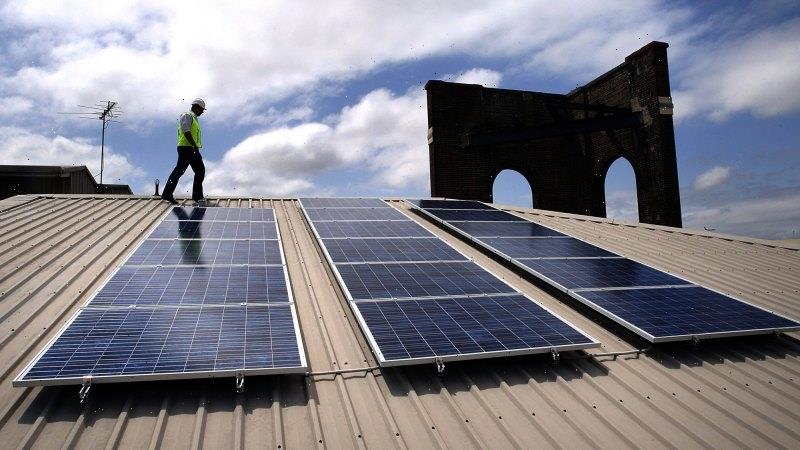Key points
- Proposed City of Melbourne planning reforms would ban gas connections in all new buildings and require the installation of solar panels and rainwater collection tanks.
- Electric vehicle chargers and bicycle parking would be mandated in all new high-rise buildings and developers would be incentivised to install green rooftops and vertical gardens.
- Melbourne’s carbon emissions in the inner city are one of the highest in the world at 31 tonnes per person and Melbourne’s buildings are a big contributor to this.
Gas connections would be banned and solar panels and electric vehicle chargers would be compulsory under planning reforms proposed for Melbourne’s new large residential buildings.
The City of Melbourne has pitched a suite of new rules which would require all high-rise developments to meet international energy efficiency standards.
Developers will have to install rooftop solar panels on CBD high-rise buildings under new environmental standards proposed by the City of Melbourne.Credit:Bloomberg
Rainwater tanks and bicycle parking would also be mandated under the rules, and developers would be required to install green rooftops and vertical gardens.
Deputy Lord Mayor Nicholas Reece said the changes were “very forward-leaning” but were the right thing to do as carbon emissions in inner Melbourne were one of the highest in the world, at 31 tonnes per person.
Emissions in other cities were about six tonnes per person, according to the Organisation for Economic Co-operation and Development. In the Greater Melbourne area, emissions are close to 14 tonnes per person.
“This is Melbourne’s dirty secret,” Reece said. “If we’re serious about being the world’s best and most livable city, then we cannot tolerate being the highest-polluting. Something has to be done.”
Buildings account for 66 per cent of all emissions across inner Melbourne, compared to only 25 per cent in the rest of Victoria because of the density and size of buildings in the city centre.
New buildings will be assessed under a points system, which gives developers extra credit for inclusions such as rooftops with gardens or walls with plants.
“Different sizes or types of buildings will have a different green factor score that they need to achieve in order to receive planning approval,” Reece said.
“This is going to drive a green roof revolution for Melbourne. It’s going to turn every new apartment and office house into an oasis of greenery and foyers and building walls.”
Reece said the sustainable building standards were a step towards reaching the City of Melbourne’s target of zero net emissions by 2040. State Planning Minister Jacinta Allen has already reviewed the planning reforms.
Councillor Elizabeth Doidge said the reforms would not make it more expensive to construct new buildings.
“The top-tier builders are already building to these standards and the new developments are already looking at the service, especially the best developments in the city,” she said.
Caitlin Uren, the head of environmental, social and corporate governance capital markets for real estate company JLL Australia, said there would be an adjustment period where people would have to rethink the feasibility and cost of their projects, although the reforms were necessary.
Melbourne Deputy Lord Mayor Nick Reece and councillor Elizabeth Doidge at a green wall at Prima Tower in Southbank.Credit:Justin McManus
“If you as a developer can provide a building which is not providing any greenhouse gas emissions because you’re all electric, you’re highly energy efficient and ideally, you’re plugged into a renewable energy network, then you are creating a more resilient asset in the market,” Uren said.
“Yes, there is an additional cost perhaps in the transition period, but certainly the upside of income and flow-on of additional capital value is offsetting that cost.”
Uren said she appreciated some people “aren’t thrilled” about losing a gas connection, but the changes were a necessary societal shift.
“What’s the point in investing in all this renewable infrastructure and grid when we’re just going to keep using fossil fuels within the buildings?”
The planning reforms will not apply to existing buildings but include policy to encourage sustainable retrofitting measures, including the retention of reusable parts of existing buildings.
“This is focusing on new constructions, on renovations,” Uren said. “The next piece will be around certainly looking at the existing built form.”
The planning scheme amendments are open for public consultation until April and will then be submitted to the state government for approval.
The Morning Edition newsletter is our guide to the day’s most important and interesting stories, analysis and insights. Sign up here.
Most Viewed in National
From our partners
Source: Read Full Article


